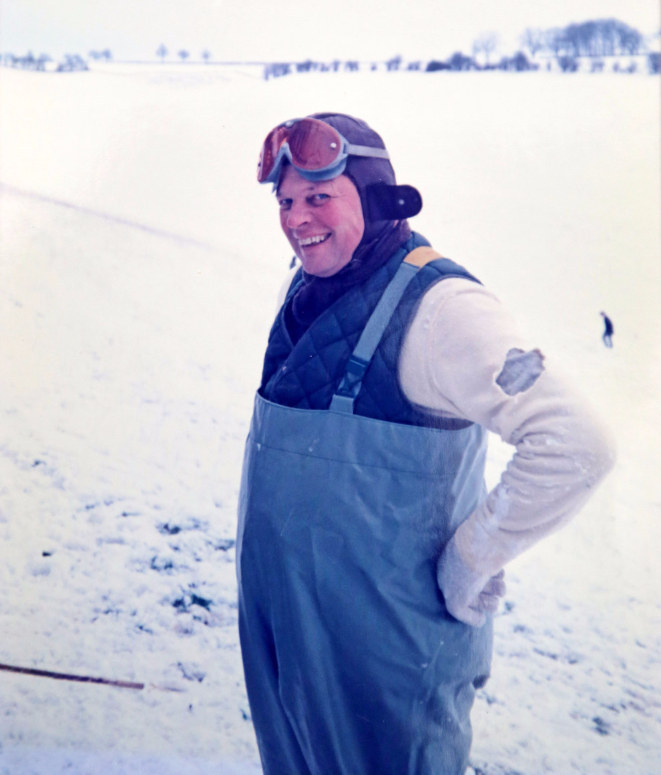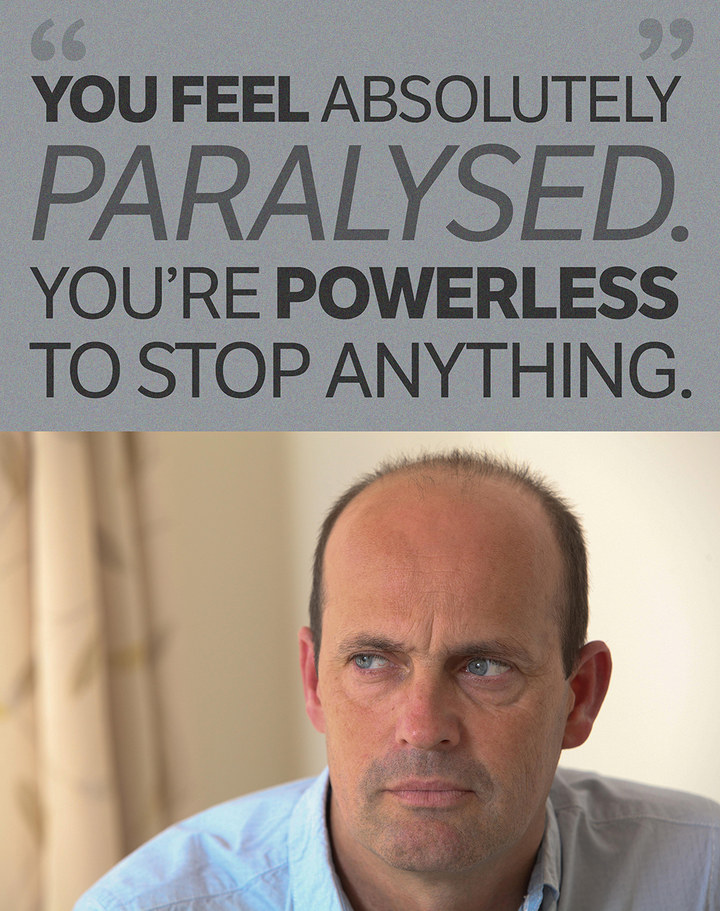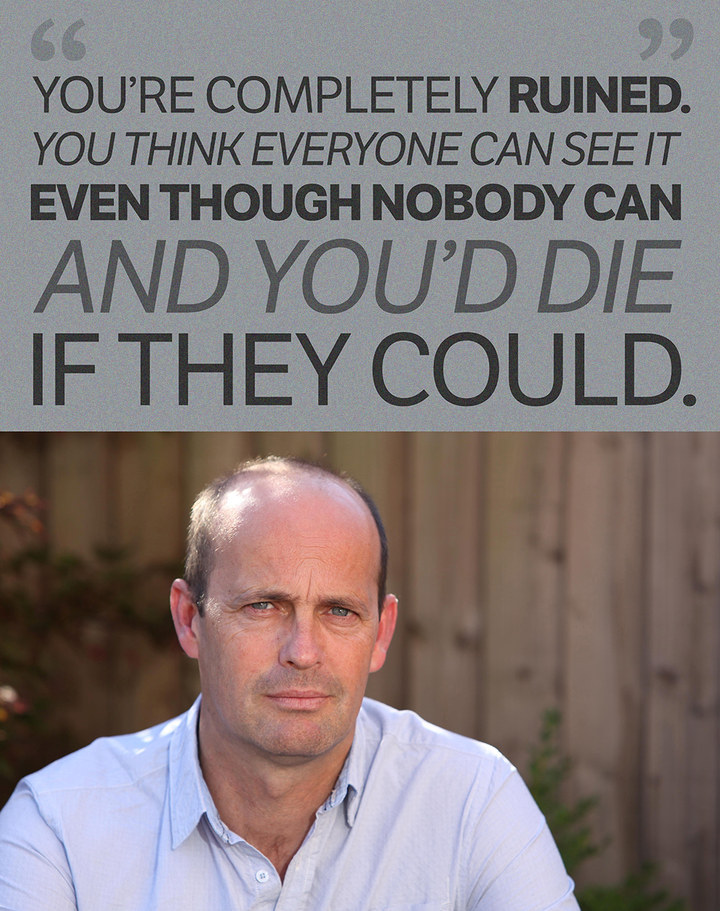
SWNS for BuzzFeed News
David was groggy when he woke up, he says. As he looked around, he knew where he was, because he had been there before: an apartment in Dolphin Square, central London. There was something else that was familiar. He was, he says now, wincing, “naked”.
He was 15. His eyes flicker up to the right, reliving those moments in 1982 as if he were back there.
“It’s obvious that something’s not right,” he says. “It's extremely painful.” Memories from the night before would intrude in flashes – being taken to a restaurant, to a table of men, and being told who they were: politicians, businessmen, senior members of the Church of England. Sometimes other boys his age were there too.
As he looked down there would be another clue. “There’s blood and bodily fluids,” he says. The blood would be his, but the semen was not. He did not know then that it would take more than 30 years to try to find out whose it was.
This is a story about a secret. At its heart is a man who has spent his life searching for justice but kept being denied it, blocked by forces he found hard to understand. Dominating everything, however, was a prolific child abuser with establishment connections whose name has been kept from prominence – until now.
When BuzzFeed News began investigating this story, the details, which pointed to a clutch of paedophiles operating across some of our most powerful institutions, seemed at first too grim and too outrageous to hold up. That was until we started examining the evidence, until the files began to surface, forced into the open through the Data Protection Act and the coroner’s court. These files not only corroborated David’s story, but expanded on it. There were details he wished he had not discovered.
What emerged casts a different light on what we have heard. It reveals how a child from a loving family comes to fall into the hands of powerful predators, how boys like him were brought from the countryside into the capital for sexual exploitation – and what is stacked against them when they come forward. Most surprising is what this case reveals about the police: how despite the prominence now afforded to sexual abuse, they continue to behave in strange and unaccountable ways. Ways that lead to troubling questions.
David, now 49, sits upright in an armchair, hands gripped together, revisiting as much as he can. He has decided to forego his right to anonymity – for his real first name and photograph to be used – in the hope that he will, at last, be heard.
We talk in a hotel room for two days. It is the start of the investigation, and as David begins it seems his story is centred on sexual abuse – until something perhaps more startling appears.
There are things he has never said aloud to another person.

David as a teenager outside Dalby House.
David
It was a family friend who first took an interest in David. His name was Gordon Dawson.
In spring 1982, two months after turning 15, David moved with his parents and older brothers to Skendleby, a small, picturesque village in rural Lincolnshire. Pretty cottages punctuated the vast fields and farmland stretching out around the village. Dawson’s property came within two fields of their home.
David loved country life. Rarely watching television or reading newspapers, he instead preferred riding and cycling, and was, he says, unworldly for his age. He was very shy and very skinny, with a mass of dark hair atop sharp features.
David’s father had previously had business dealings with Dawson, who was a landed farmer. And so when one day Dawson came to the family home to apologise for his uncle clipping David’s mother’s wing mirror, there was already a connection.
The visit sparked a close friendship between Dawson and David’s parents, enabling him to pop in for a chat several times a week.
“He was big, broad, burly,” says David, with “wraparound” hair, and seemed “jovial, warm, and very clever”. David was aware of the power and wealth Dawson enjoyed.
“He was a big figure locally, a local ombudsman, involved in the church and the local dioceses. Well-respected, well-connected, knew everybody.”
Dawson lived with his wife in Dalby House, a huge country estate set in a thousand acres of land. It was there, amid the hedgerows and woodland of the estate, that Dawson indulged in his favourite pastime: shooting. He liked to include local boys in his pursuit. He would hold days for them called the “Young Boys’ Shoot”, says David, and never expected payment.

Gordon Dawson in the early 1980s.
David
But Dawson offered to give David free one-to-one lessons – an immensely generous offer, it seemed. And so, every couple of days, he would take David out to shoot rabbits. At night they would do so from inside his car. After the shot was fired, Dawson would keep holding on to him.
“I felt uncomfortable, but at the time you don’t know how to compute it,” David says, frowning, as if frustrated with himself. Over the course of one week in early summer 1982 that discomfort escalated.
“I remember him putting his hand on my leg. Things would happen gradually over the night – more and more touching… You just freeze. I didn’t have the experience to know what to do. He’s the adult, the same age as my father. By the time he’s got his hand on your crotch you’re just… You can’t breathe. You feel absolutely paralysed. You can’t recognise what’s going on because you don’t understand. You’re powerless to stop anything and he then decides he’s going to put his hand inside…”
David stops, before forcing himself to carry on. “…he’s going to take your zip down and then it just happens. You just want it over as quick as possible.”
In the darkness, surrounded by private land, Dawson, says David, raped him. He didn’t know at the time what the word was for what had happened. “I didn’t understand. Now I look back and that was absolutely what it was.” David looks up intently, as if wanting to emphasise what took place there.
“I could show you on the map where the first time happened,” he says. He remembers coming home afterwards. “I didn’t know what to say to my parents. I didn’t want to upset them.”

Rebecca Hendin / SWNS for BuzzFeed News
Dawson was charming and generous, leading David’s parents to believe their neighbour was a good friend. They had no idea what he was capable of.
David begins to set out the pattern of behaviour Dawson was establishing – “he wasn’t that bothered about you touching him, it was all about him using you” – when two aspects emerge that provide a vital clue to the later events in London. Dawson would never ejaculate, says David, and had such a small penis that being raped by him did not cause David bleeding, significant pain, or injury.
Desperate to get away from Dawson, David told his parents he hated his new school, that he was struggling there, and complained so vehemently that they eventually agreed to let him return to his old school in Cambridgeshire, a two-hour drive away. It meant staying with old friends during the week. “I thought I was removing myself from the situation,” he says. It would prove catastrophic.
Dawson offered to pick him up on Friday nights. At first this meant stopping in country lanes on the way back to Lincolnshire. “He would turn off the engine and say, ‘Right,’ and that was it – you would think, ‘Get it over with,'” David says. But shortly afterwards, in autumn 1982, Dawson made David’s parents another offer.
“He would say, ‘I’ll take David to London for the weekend and we’ll go to the theatre!’ I couldn’t get out of it – my parents would say it’d be great.”
By this stage, says David, he was becoming increasingly withdrawn. But how was he feeling? After hours of talking, remaining as calm and controlled as possible, David suddenly doubles over.
“Empty,” he says, his voice strangled as he rubs tears away and attempts to carry on. “That’s a horrible thing…” he whispers, “…a horrible thing…” He apologises and tries to regain composure. “Empty because there’s nothing left: It’s a shell. You’re completely ruined. You think everyone can see it, even though nobody can and you’d die if they could.”

Rebecca Hendin / SWNS for BuzzFeed News
David remembers the first time Dawson took him to Dolphin Square, a vast 1930s complex in Pimlico, just a few streets from Westminster. “To me it was very grand,” he says. The 15-year-old, unused to such a venue, thought it was a hotel, and would later refer to it as such in his police statement.
He remembers an underground car park from where they would walk up steps on to street level, to an arcade of shops, and then up more staircases and corridors to reach a flat. (Years later, he says, a family friend told him it was owned by Dawson and two other men.)
David can still picture the inside: “Very bijoux, cottage-y, magnolia walls, but the curtains were quite pretty – yellows, blues, and greens – and that theme ran throughout.”
On these trips to London, they would go shopping. Some of the gifts – photos, paintings, a briefcase – would end up in police possession. Traumatised by the memories, David is unsure of the exact number of times he was taken to Dolphin Square, but says his mother has told him it was “at least 10 times”. There was somewhere else Dawson took David, he says.
“We would go to church meetings at the [General] Synod.” David would sit in, bored and unaware of Dawson’s precise role there. But as they walked round Dolphin Square, says David, Dawson would tell him that people from the Synod also had flats there.
In the corridors of the square, they would bump into other residents, he says – suited men who knew Dawson and would stop to chat.

Dolphin Square
Carl Court / Getty Images
“It was all very jolly and familiar. He was very well-regarded. And I knew that lots of MPs lived there, and people from the church, because he told me.” (Reports suggest over 100 MPs have had flats in the square.)
In the evenings Dawson would take him to restaurants – most frequently to Motcombs, an upscale establishment in Belgravia – where a table of men would be waiting.
“He would tell me there were people there [at the table] who had big military careers, people from the church – he would say that some are from the Synod – and then [also] MPs. There always seemed to be a parliament connection. They’d always be talking about something that had come up that day in the House [of Commons].” David would be introduced to them but, still only 15, would never be told their names.
“He [Dawson] was very cut and dried about that. He would say, ‘You need to stop asking so many questions. You just need to remember these people are really important and you need to not tell anyone about this.’”
As they ate, Dawson would give David red wine, he says.
“Sometimes at the dinners there was someone else my age,” he says – boys accompanying other men there. They wouldn’t be sat together.
The problem for David is that his memories cut out before the end of the evenings.
“I cannot remember leaving a restaurant,” he says, frustrated again. “[It] becomes very hazy, like you disappear, drift off, and then suddenly it’s the next day. I knew things had happened by the time I woke up, because it’s one thing Gordon having anal sex with you because he was very small and all the times he abused me he never climaxed.” Waking up in Dolphin Square, however, was different. He revisits the scene in his mind, his voice tightening.
“If I was really sore, or it’d been particularly bad, then I would be worried,” he says. His response by then was practical. “You’ve got to tidy yourself up. I was really upset if there was a mess on the sheets, because I’d think, ‘Oh god, someone’s going to know.’ So I used to take the sheets off the bed before we left and put them in the bin.” He stops for a moment, suddenly seeing those times with the perspective of an adult.

Rebecca Hendin / SWNS for BuzzFeed News
“That’s when you’re completely broken.”
Sometimes, on waking, he would hear male voices in the flat – men who would leave soon after. After disposing of the sheets, David would have a bath as soon as he could, but Dawson, he says, would often join him: “I said no on many occasions but it didn’t work.”
On the way back to Lincolnshire, “Gordon would say, ‘No one’s going to believe about Dolphin Square,’ and I didn’t really understand what he meant. It’s not until now that I understand the gravitas of it. Then, I thought that referred to the fact that physically [the abuse] had been quite a big event. What he was referring to, more than likely, was the people.”
The gaps in David’s memories follow a set pattern: being in restaurants, and then nothing until he wakes up in Dolphin Square. An acquaintance has since suggested to David that he might have been drugged, but David doesn’t know.
“I know I was abused by Gordon, raped by him,” he says. “And there were certainly other people involved, there had to be, because of the after-effects and physical ramifications, but I don’t know who.” David is certain about this: After being raped in Lincolnshire, he would not bleed, be in pain, or have semen on him – a distinct difference to waking up in London.
Another memory taunts David. In addition to the trips to Dolphin Square, Dawson took David shooting on a few occasions to Blickling Estate, a stately home with vast grounds in Norfolk. While staying in local guesthouses, Dawson would abuse David again, he says.

Blickling Hall
ThinkStock
One night in the room they were sharing, “I remember something getting going, I remember there being more than one person – it wasn’t just Gordon, there were two others. I remember someone’s face being so…” he gestures a few inches away from his face. “I can remember being forced into the bed, trying to see, and this chap’s face is here and he had white/grey hair. I remember his hair because he had a lot of it.”
From the age of 17, after more than two years in Dawson’s grip, David finally began to get away, by refusing to see him or go to London. By then, and despite an unusually high IQ, David had dropped out of school. He retreated from people – “you’re safe on your own” – spending time instead with his horses. What was going through his mind during that period?
“That I might be finished… That my life might be over…” He stops and breathes for a moment. “…but it didn’t mean it had to be wasted.” David vowed that somehow he would seek justice and find a way to use what happened to help others. The determination to do so would keep him going for years, fuelling everything that was to unfold.
David tried to build a life. He had a relationship and told his partner what had happened to him. He became a racehorse trainer. But all through the 1980s and 1990s he lived with the memories of Gordon Dawson and Dolphin Square. In 1996, he disclosed what happened to a woman who’d lived next door to him growing up, who also knew Dawson, and whose later police statement has been seen by BuzzFeed News.
“Elizabeth’s first words were, ‘I wondered how long it was going to be before you told me.’ Her husband used to say, ‘Why does that boy come down here talking to you?’ And she used to say to him, ‘Because he’s got something to tell me and one day he will.’”
It wouldn’t only be Elizabeth David would tell. After more than 20 years carrying shame and memories he could not bear, David decided to fulfil the promise he’d made to himself two decades earlier. Although fearful of what would happen, and having long attended a support group for abuse survivors, David finally contacted the police in February 2007. He thought he was doing the right thing.